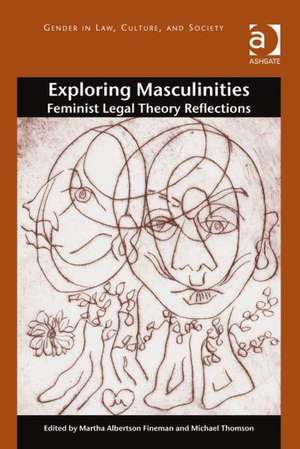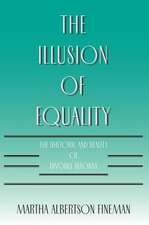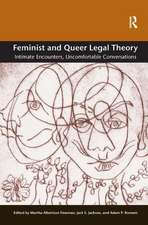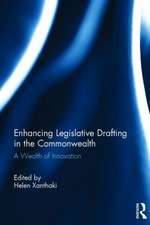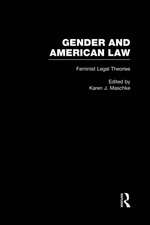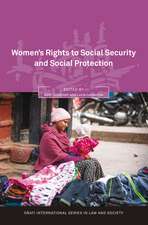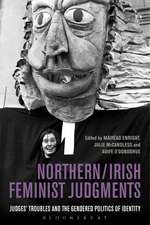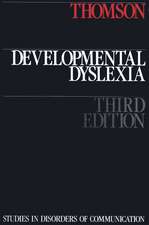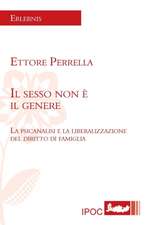Exploring Masculinities: Feminist Legal Theory Reflections: Gender in Law, Culture, and Society
Editat de Martha Albertson Fineman, Michael Thomsonen Limba Engleză Paperback – 21 noi 2013
| Toate formatele și edițiile | Preț | Express |
|---|---|---|
| Paperback (1) | 494.70 lei 6-8 săpt. | |
| Taylor & Francis – 21 noi 2013 | 494.70 lei 6-8 săpt. | |
| Hardback (1) | 1069.71 lei 6-8 săpt. | |
| Taylor & Francis – 28 oct 2013 | 1069.71 lei 6-8 săpt. |
Preț: 494.70 lei
Nou
Puncte Express: 742
Preț estimativ în valută:
94.66€ • 98.83$ • 78.34£
94.66€ • 98.83$ • 78.34£
Carte tipărită la comandă
Livrare economică 04-18 aprilie
Preluare comenzi: 021 569.72.76
Specificații
ISBN-13: 9781472415127
ISBN-10: 1472415124
Pagini: 414
Ilustrații: black & white illustrations
Dimensiuni: 156 x 234 x 22 mm
Greutate: 0.58 kg
Ediția:New ed
Editura: Taylor & Francis
Colecția Routledge
Seria Gender in Law, Culture, and Society
Locul publicării:Oxford, United Kingdom
ISBN-10: 1472415124
Pagini: 414
Ilustrații: black & white illustrations
Dimensiuni: 156 x 234 x 22 mm
Greutate: 0.58 kg
Ediția:New ed
Editura: Taylor & Francis
Colecția Routledge
Seria Gender in Law, Culture, and Society
Locul publicării:Oxford, United Kingdom
Notă biografică
Martha Albertson Fineman is a Robert W. Woodruff Professor of Law at Emory University and an internationally recognized law and society scholar and a leading authority on family law and feminist jurisprudence. Fineman is founder and director of the Feminism and Legal Theory Project, which was inaugurated in 1984 at the University of Wisconsin at Madison, and also directs Emory’s Vulnerability and the Human Condition Initiative. She is the author of numerous books and dozens of book chapters and scholarly papers focusing on gender equality, the legal regulation of intimacy and the law’s response to dependency and vulnerability. Fineman is also editor and contributor to a dozen collections arising from the FLT Project, including At the Boundaries of Law: Feminism and Legal Theory (Routledge 1991, reissued 2013), which was the first anthology of feminist legal theory. Michael Thomson is Professor of Law at the University of Leeds, UK. His research interests include Health Law, Law and Gender, and Legal Humanities. Much of his work has focused on the regulation of reproductive and sexed bodies and what this can tell us of the relationship between law and gender. He is the author of Reproducing Narrative: Gender, Reproduction and Law (Dartmouth, 1998) and Endowed: Regulating the Male Sexed Body (Routledge, 2008), He also edited, with Sally Sheldon, Feminist Perspectives on Healthcare Law (Cavendish, 1998).
Recenzii
’Whether discussing specific institutions, or geographic locations, or exploring thorny theoretical problems, the authors in this volume range widely and probe deeply to situate masculinity in current legal conversations. Exploring Masculinities is more than useful; it's necessary.’ Michael Kimmel, Stony Brook University and Director, Center for the Study of Men and Masculinities, USA This volume of essays provides a rich diet of research and scholarship exploring the complex interweaving of masculinities and law. Through both a wide variety of substantive case studies and critical perspectives, the essays collected here offer an invaluable snapshot of current debates and perspectives. The interdisciplinary perspectives and multijurisdictional inquiries make this volume of interest to a wide range of scholars, researchers and activists. Leslie J. Moran, University of London, UK
Cuprins
List of Tables, Notes on Contributors, Acknowledgements, 1 Introduction, Part I Feminist Legal Theory and Masculinities and Law, Part II Deconstructing Masculinities in Location, Part III Confronting Law, Part IV Education, Part V Work, Part VI Family, Bibliography, Index
Descriere
Written by leading experts in the area, this volume investigates the ways in which emerging masculinities theory in law could inform feminist legal theory in particular and law in general. As many of the chapters in this collection illustrate, law is constantly in a dynamic interaction with masculinities: it has both influenced existing masculinities and has been influenced by those masculinities. The contributions focus feminist and critical theoretical attention on masculinities and consider the implications of masculinities theory for law and legal theory.
